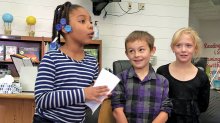New Study Shows the Impact of PBL on Student Achievement
Researchers in Michigan show that project-based learning in high-poverty communities can produce statistically significant gains in social studies and informational reading.
Your content has been saved!
Go to My Saved Content.Does project-based learning (PBL) raise student achievement? If you’ve been involved in PBL for long, you’ve undoubtedly encountered this question. Over the last few years as education researchers at University of Michigan and Michigan State University, we have worked to address this question through a large study of the effects of PBL on social studies and some aspects of literacy achievement in second-grade classrooms. We call this initiative Project PLACE: A Project Approach to Literacy and Civic Engagement.
About the Study
In our study, we randomly assigned second-grade teachers in high-poverty schools that had low performance on state tests to two groups. One taught social studies using the project-based units we designed (the experimental or PBL group), and the other taught social studies as they normally did (the control group). We asked teachers in both groups to teach 80 social studies lessons over the course of the year, so that we would be comparing two different ways of teaching social studies, rather than teaching social studies versus not.
None of the teachers involved in the study reported previous experience teaching PBL. PBL-group teachers received detailed plans for four project-based units (on economics, geography, history, and civics and government). Each of the 20 sessions in a unit was written out in detail, while leaving room for some teacher and student voice and choice. Sessions were tightly aligned to Michigan social studies and informational reading and writing standards (which are the Common Core State Standards) and included research-supported instructional practices. (See our article “Projects That Have Been Put to the Test” for more detail.)
Teacher Support
We wanted the study to be realistic in terms of the degree of professional development (PD) support districts might be likely to provide to teachers, so PBL-group teachers received only three hours of initial PD in our approach to PBL and the first PBL unit. Over the course of the year, they watched brief videos introducing the subsequent three units. In addition, coaches from our research team visited teachers an average of 11 times over the course of the year. These visits allowed our team to provide a form of PD as well as to systematically rate the degree to which teachers were implementing each of the three parts of our project/unit sessions as intended. Our team also observed control-group classrooms to gather information about what business-as-usual social studies instruction was like, and to determine whether any control-group teachers used PBL (none did).
Assessment Design
At both the beginning and end of the school year, we administered assessments of social studies, informational reading, and informational writing aligned to Michigan’s standards. We developed all of these assessments ourselves, as appropriate measures were not otherwise available. Experts checked alignment of test items with standards, providing evidence of the validity of the assessments. Those who scored the assessments reached high levels of agreement, suggesting that the assessment scoring system made sense and could be used in a reliable manner. Children in both the experimental/PBL and the control group took the assessments, and when we scored them, we did not know which group the assessment was from. In addition to normal randomized-controlled-trial design, we also administered the assessments to second graders in a high-socioeconomic-status (SES) school district that did not use our units, so that we could compare the PBL group not only to a comparable control group but also to a high-SES benchmark.
Results
Our analyses found statistically significant differences overall favoring the PBL group over the control group in social studies (effect size = 0.482) and informational reading (effect size = 0.181). In the PBL group, gains were 63 percent higher for social studies and 23 percent higher for informational reading than in the control group. In informational writing, differences between the groups overall were not statistically significant. However, informational writing growth was higher, at a level of statistical significance, among teachers who were rated as implementing unit sessions more as intended. (Visit this page to find a link to the latest version of Duke, Halvorsen, Strachan, Konstantopoulos, & Kim, 2017 for details.)
The gap in performance between children in the PBL group and children in the high-SES school district who did not experience our project-based units narrowed in social studies, informational reading, and informational writing (and did not narrow, or narrowed less, for the children in the control group).
Conclusions About PBL and Student Achievement
So does PBL raise student achievement? Our version of PBL did work to improve achievement as compared to business-as-usual instruction in high-poverty, low-performing school districts. We do not claim that all versions of PBL work, or in all contexts. For example, over the years, we have observed some versions of PBL that are far less standards-aligned than what we designed and that do not incorporate specific research-supported instructional techniques—these may have been shown to be ineffective using our research design. And as noted, PBL was more effective in classrooms where it was implemented with a higher degree of fidelity to the intended model.
Rather than saying that PBL raises or does not raise student achievement compared to other approaches, the most defensible stance from our research is that PBL can raise student achievement in high-poverty communities. Next steps in our field are to continue to inquire and refine our understanding of the specific circumstances under which it does raise student achievement and as compared to what. That is the project for project-based learning.
Project PLACE was funded by the Spencer Foundation and Lucas Education Research of the George Lucas Educational Foundation.
